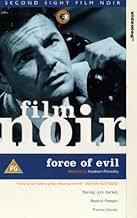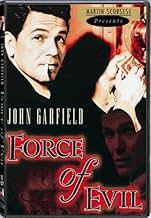Füge eine Handlung in deiner Sprache hinzuAn unethical lawyer who wants to help his older brother becomes a partner with a client in the numbers racket.An unethical lawyer who wants to help his older brother becomes a partner with a client in the numbers racket.An unethical lawyer who wants to help his older brother becomes a partner with a client in the numbers racket.
- Auszeichnungen
- 4 wins total
- Freddie Bauer
- (as Howland Chamberlin)
- Comptroller
- (Nicht genannt)
- Sorter
- (Nicht genannt)
- Sylvia Morse
- (Nicht genannt)
- Sorter
- (Nicht genannt)
- Detective
- (Nicht genannt)
- Mother
- (Nicht genannt)
- Attorney
- (Nicht genannt)
Empfohlene Bewertungen
Thematically, Marxist Polonsky and co-scripter Ira Wolfert take a shot at the Darwinist world of capital, where big fish survive by eating smaller fish or by muscling in on the catch (Ficco's strategy), while working class minnows offer up dimes and quarters in hopes of instant metamorphosis. It's an ugly world where corruption and greed reach from top to bottom. Since the Production Code of the time couldn't leave matters in an unregenerate state, an upbeat ending is tacked on that defies the logic of what has gone before. Nevertheless, the sharply-etched images remain, vividly - memorably. And it's ironic that any intended remake will have to consider that the biggest fish of all has taken over the numbers racket and renamed it - the State Lottery. I wonder if Polonsky was amused.
The character of Leo, superbly played by Thomas Gomez, is inherently honest and noble but he must live and work in the naturally shady numbers racket. He knows that he will be eventually crushed. This knowledge makes Leo one of the most bitter and tragic characters in film...a decent man whose life is dominated by futility.
The protagonist of the film, portrayed by John Garfield, is Leo's brother. He has ridden his job as a sleazy mob lawyer to a life of fame and ease. He has everything Leo doesn't. Yet despite his blustery banter, he,too,is uneasy with his position. He knows Leo is headed for disaster and pulls all the strings he can to protect him, even though Leo reacts to him with contempt. Their relationship is doomed by the corrupt methods both use to survive. Garfield's character finds redemption of a sort by the film's end but not before inevitable tragedy has struck.
There are many more levels to this complex film and discussion of them all could fill many pages. Above all, it is a beautiful movie,expertly directed with tremendous black and white imagery. The dialogue combines snappy patter with almost poetic sensibility. And the performances of all concerned are top notch. This is truly a treasure of cinematic art. Be prepared to think deeply when you watch it
The plot which unfolds is a terse, melodramatic thriller notable for realist location photography, almost poetic dialogue and frequent biblical allusions (Cain and Abel, Judas's betrayal, stigmata).
What I really liked about this film is how it portrays the numbers racket. Whoever wrote this clearly knew what he was talking about. As someone who has studied the Mafia and its activities, I have a pretty good idea of how the numbers business works and how it can (or cannot) be rigged. These concerns are addressed in a very knowledgeable way.
The problem is, Joe's older brother Leo (Thomas Gomez) runs one of those smaller booking outfits. He is 50 with heart trouble and Joe figures that loosing his business like this will finish him off. Joe wants to tell Leo outright what is going on so he won't take bets for the 4th of July, but is ordered in no uncertain terms by the head of the syndicate to not tell his brother anything.
It's at this point the film loses its way. I can't tell you WHY anybody does anything from this point forward. For example, Joe tells the cops to raid his brother's bookie joint supposedly to get him to not take bets for the 4th of July, but his brother still gets out of jail before the 4th of July and ends up taking bets for the 4th and going broke anyways. What was the point? Joe takes an outsized romantic interest in a young girl working in his brother's gambling joint - Beatrice Pearson as Doris - even though it is obvious she is not remotely interested in him unless he reforms, and he is not the least bit interested in reforming.
I rated this as above average because of the great noirish photography, good dialogue, and fine acting. It is just too bad it was not in service to a more coherent plot.
But a few differences help cast a light on what this is:
- the protagonist is not a gumshoe unraveling a case or hapless schmuck crushed by the fates. He's a cocky narrator, as much in control of what happens as anyone else, and in on it from the start. He has the usual fast-talking bravado, he glides smoothly, sweeps the girl off her feet. And yet his real impetus is wanting to pay back a big brother who sacrificed to get him out of tenement life.
- the girl is not some world-savvy dame but a sweet, innocent soul who instinctively backs out of the racket when it starts to feel wrong and is ready to fall for him only tentatively, guarding herself as she gives way.
All through this New York looks gritty rather than sultry, the narrative light is harsh and anxious. The contrast is between not entirely legal but not entirely immoral slum life, and the new cut-throat world of big business coming for the little guy. It's a bit of stretch to show the smalltime hustlers as the personable 'good guys' but that's the short-hand used. Its real progenitors are gangster films.
- And third, there is a scheme underway that resolves all this, to turn a numbers racket run piecemeal from tenement backrooms into a respectable, lucrative business run from Wall Street.
There's a lot of talk throughout, in that rat-tat-tat fashion of Hollywood. The dialogue verges on histrionic, and the whole has a verbose feel, but one that feels like someone has studied this life and is trying to come back with an honest depiction. It has a thickness of world to it, although the mannerisms are obvious.
Here's the cinch and what probably earned the movie a reputation as left-wing and landed the filmmaker in the famous HUAC blacklist.
The scheme works, the older brother eventually goes along with it, who had earlier made a big moral stand against it. The girl is swept off her feet. Our guy stands to make a fortune, help his brother, and get the girl who is not a dame like his boss's wife.
Except, in unchecked capitalism no one is really in control. Police had been watching but it's the nerve-wracked bookkeeper who sets the scene for grievous consequences to follow. The moral resolution is that it works but at what price to the soul; the lesson remains that a life of scheming doesn't pay and I'm not bowled over in this case.
Even more pertinently however, were the smalltime hustlers a boon to their community? They were running much the same lottery, working peoples' money for the promise that maybe this week it'll be you. But it seems there were bonds of community which the merger frays and disturbs. You'll see that it's our hero's tie to a human story rooted in community that really foils the plan.
The evocative finale with the couple descending stairs with the Brooklyn Bridge hulking above them is a favorite. In fact my favorite bits here all revolve around these two and their unlikely bond, their playful interplay against the larger background.
Wusstest du schon
- WissenswertesIn order to show cinematographer George Barnes how he wanted the film to look, Abraham Polonsky gave him a book of Edward Hopper's Third Avenue paintings.
- PatzerDuring a climactic montage set at an East Coast racetrack on the Fourth of July, people in the stock footage crowd scenes are dressed in winter garments nobody would wear in the middle of summer.
- Zitate
[after Joe bails his brother, Doris and the others out of jail]
Doris Lowry: You know I've got my whole life to think about now and you won't be of any help.
Joe Morse: How do you know? You know everything I touch turns to gold. It's raining out and I promised my brother to take you home.
Doris Lowry: Well, that's a lie.
Joe Morse: Well, it's not true; but I would have had he asked. You know you can't tell about your life 'til you're all through living it. Come on, I'll give you a lift. You're tired, I'm tireder. What can happen to either one of us? You tell me the story of your life and maybe I can suggest a happy ending.
- Alternative VersionenAll existing copies of the film are of the version that was cut by 10 minutes in order to fit into a double bill.
- VerbindungenEdited into American Cinema: Film Noir (1995)
Top-Auswahl
- How long is Force of Evil?Powered by Alexa
Details
- Erscheinungsdatum
- Herkunftsland
- Offizielle Standorte
- Sprache
- Auch bekannt als
- Force of Evil
- Drehorte
- Produktionsfirmen
- Weitere beteiligte Unternehmen bei IMDbPro anzeigen
Box Office
- Bruttoertrag in den USA und Kanada
- 948.000 $
- Weltweiter Bruttoertrag
- 1.165.000 $
- Laufzeit1 Stunde 19 Minuten
- Farbe
- Seitenverhältnis
- 1.33 : 1
Zu dieser Seite beitragen




































